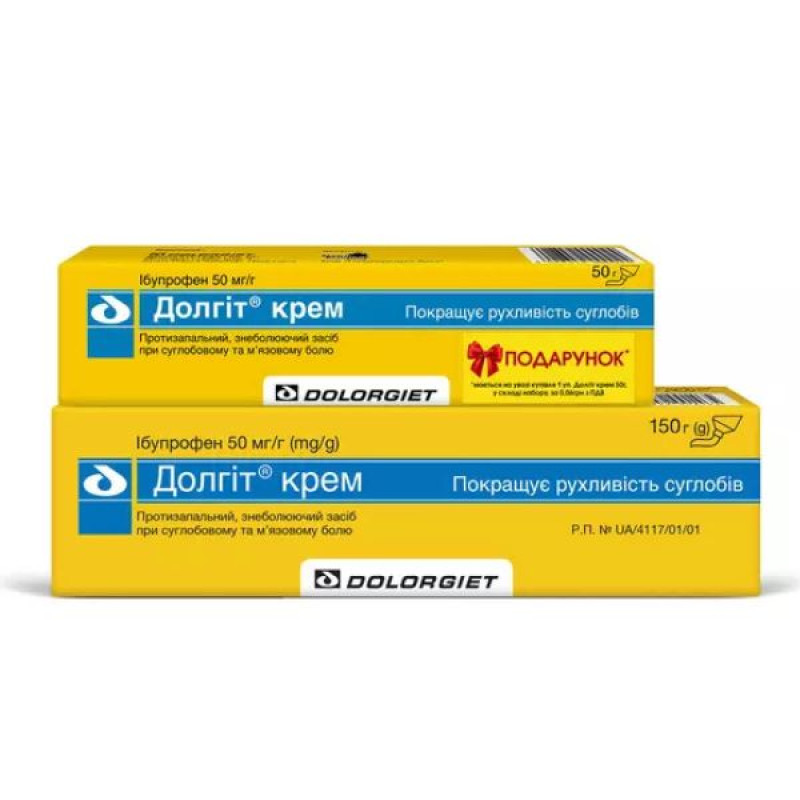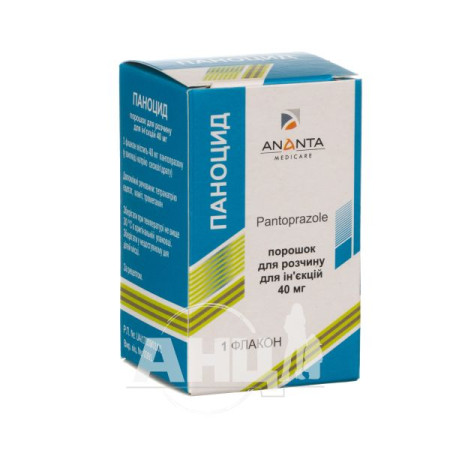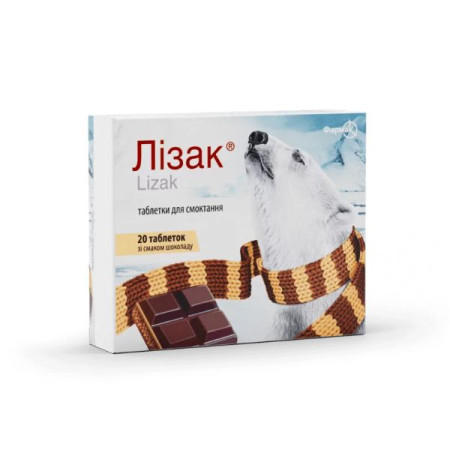Set Dolgit cream 150 g + Dolgit cream 50 g in tubes

Instructions Set Dolgit cream 150 g + Dolgit cream 50 g in tubes
Composition
active ingredient: ibuprofen;
1 g of cream contains ibuprofen 50 mg;
excipients: medium chain triglycerides, glycerol monostearate (E 471), macrogolstearate 1500, macrogolstearate 5000, propylene glycol (E 1520), sodium methylparahydroxybenzoate (E 219), xanthan gum (E 415), lavender oil, neroli oil, purified water.
Dosage form
Cream.
Main physicochemical properties: homogeneous, soft cream from white to cream color with a lavender-citrus odor.
Pharmacotherapeutic group
Topical agents for joint and muscle pain. ATX code M02A A13.
Pharmacological properties
Pharmacodynamics.
"Dolgit® Cream" is a nonsteroidal anti-inflammatory and analgesic for topical use for joint and muscle pain. Ibuprofen - the active ingredient of the drug "Dolgit® Cream" - has a pronounced anti-inflammatory, analgesic and moderate antipyretic effect, reduces swelling that occurs with inflammation caused by injuries or rheumatic diseases, improves joint mobility. The pharmacological activity of the drug is due to its ability to inhibit the synthesis of prostaglandins.
When applied topically, ibuprofen is rapidly absorbed through the skin and penetrates into the focus of inflammation. Penetration to the site of action may vary depending on the degree and type of lesion, as well as the site of application and the site of action.
In joint tissues, therapeutic concentrations are maintained for several hours, while in blood serum the active substance is present in only a small amount, so systemic action is practically absent.
Pharmacokinetics.
Biological transformation of ibuprofen occurs in the liver. Pharmacologically inactive metabolites are eliminated by the kidneys (90%) and also with bile. Ibuprofen is 99% bound to plasma proteins. The half-life is 1.8–3.5 hours.
Indication
For local treatment of degenerative joint diseases with pain syndrome (arthrosis), inflammatory rheumatic diseases of the joints and spine, swelling or inflammation of soft tissues near the joints (e.g., bursitis, tendonitis, tendovaginitis, damage to ligaments and joint capsule), stiffness of movements in the shoulder area, lower back pain, lumbago, myalgia, sports and other injuries, such as bruises, muscle strains, sprains of ligaments and tendons.
Contraindication
"Dolgit® Cream" is contraindicated:
- with increased individual sensitivity to the active substance ibuprofen, to any of the excipients of the medicinal product or to other analgesics and antirheumatic drugs;
- for use on open wounds, for inflammatory and infectious skin diseases such as eczema, as well as for use on mucous membranes;
- in the third trimester of pregnancy.
Interaction with other medicinal products and other types of interactions
When the drug is used externally according to the recommendations, no interactions with other drugs were observed.
It is necessary to inform the doctor about simultaneous treatment with other medications, if this occurs, or about recent therapy.
Application features
Patients with asthma, hay fever, swelling of the nasal mucosa (so-called rhinopolyps), chronic obstructive airway diseases or chronic respiratory infections (especially with symptoms resembling hay fever) and patients with hypersensitivity to analgesics and antirheumatic drugs of various types are at increased risk of developing asthma attacks (analgesic intolerance/analgesic asthma), local swelling of the skin and mucous membranes (Quincke's edema) or urticaria.
The use of the drug in such patients should be carried out under special conditions and under the direct supervision of a physician. The drug should be used with caution in patients with hypersensitivity (allergy) to other substances that cause skin irritation, itching, urticaria. In the event of a skin rash, the use of the cream should be discontinued immediately.
Severe cutaneous adverse reactions, including exfoliative dermatitis, erythema multiforme, Stevens-Johnson syndrome, toxic epidermal necrolysis, drug reaction with eosinophilia and systemic symptoms (DRESS) and acute generalized exanthematous pustulosis, which can be life-threatening or fatal, have been reported with ibuprofen (see section 4.8). The majority of these reactions occurred within the first month.
If signs and symptoms suggestive of these reactions occur, ibuprofen should be discontinued immediately and alternative treatment considered (if necessary).
Do not allow the drug to get into the eyes.
It is necessary to ensure that children do not touch the areas of skin on which the drug has been applied.
If discomfort during treatment lasts longer than 3 days, you should consult a doctor.
The medicine contains 50 mg of propylene glycol per 1 g. Propylene glycol may cause skin irritation.
Sodium methyl parahydroxybenzoate may cause hypersensitivity reactions (possibly delayed).
This medicine contains fragrances (lavender oil and neroli oil) with benzyl alcohol, benzyl benzoate, citral, citronellol, coumarin, eugenol, farnesol, geraniol, limonene/d-limonene, linalool, which may cause allergic reactions.
Use during pregnancy or breastfeeding.
Pregnancy
There are no clinical data on the topical use of the drug "Dolgit® Cream" during pregnancy. Even if the systemic exposure is lower compared to oral administration, it is not known whether the systemic exposure of the drug "Dolgit® Cream" achieved after topical administration can be harmful to the embryo/fetus. During the first and second trimester of pregnancy, "Dolgit® Cream" should not be used unless clearly necessary. If used, the dose should be as low as possible and the duration of treatment as short as possible.
Systemic use of prostaglandin synthetase inhibitors, in particular the drug "Dolgit® cream", during the third trimester of pregnancy may cause cardiopulmonary and renal toxicity in the fetus. At the end of pregnancy, prolonged bleeding may occur in both the mother and the child, as well as delayed labor. Therefore, "Dolgit® cream" is contraindicated during the last trimester of pregnancy (see section "Contraindications").
Breastfeeding
Only a small amount of active ibuprofen derivatives and its breakdown products pass into breast milk. At the moment, there is no data on the negative effect on the newborn, so in the case of short-term treatment there is no need to interrupt breastfeeding. However, the daily dose of 3-4 times a strip of cream 4-10 cm long should not be exceeded, and in the case of long-term treatment it is necessary to interrupt breastfeeding.
Breastfeeding women should not apply this medicine to the breast area to avoid the medicine getting into the baby's body.
The ability to influence the reaction speed when driving vehicles or other mechanisms.
There is no data on the effect of ibuprofen in cream form on the ability to drive and operate potentially dangerous machinery.
Method of administration and doses
For external use only. Apply the medicine 3-4 times a day. Depending on the size of the affected area, apply a thin layer of the cream to the skin in the area of inflammation/pain in strips 4-10 cm long, which corresponds to 2-5 g of cream (100-250 mg of ibuprofen) followed by gentle rubbing. The maximum daily dose is 20 g of cream (corresponding to 1,000 mg of ibuprofen).
For large hematomas and edema, a cream can be used under an occlusive dressing at the beginning of treatment.
The duration of treatment is determined by the doctor. In most cases, the duration of treatment is 2–3 weeks. There is no data on the therapeutic benefit of using the drug for a longer period.
The penetration of the active ingredient can be enhanced by iontophoresis (a special form of electrotherapy). In this case, the drug is applied under the cathode (negative electrode), the current intensity is 0.1–0.5 mA per 5 cm2 of the electrode surface, the duration of the procedure is up to 10 minutes.
After applying the cream to the skin, dry your hands with a paper towel and then wash them if they are not being treated. The paper towel should be disposed of with the waste.
Before taking a shower or bath, the patient should wait until the active substance is absorbed.
Children.
Do not use in children under 14 years of age.
Overdose
If more cream than recommended is applied, remove any remaining cream and rinse the skin with water. If a very large amount is applied or if the cream is accidentally taken internally, a doctor should be informed. There is no specific antidote known.
Side effects
Classification of adverse reactions by frequency of occurrence: very common (≥ 1/10), common (≥ 1/100, < 1/10), uncommon (≥ 1/1,000, < 1/100), isolated (≥ 1/10,000, < 1/1,000), rare (< 1/10,000), frequency unknown.
Immune system disorders
Uncommon: hypersensitivity reactions such as local allergic reactions (contact dermatitis).
Respiratory, thoracic and mediastinal disorders
Rare: bronchospastic reactions.
Skin and subcutaneous tissue disorders
Common: local reactions such as skin redness, itching, burning sensation, exanthema, including pustules and vesicles.
Rare: severe cutaneous adverse reactions (including erythema multiforme, exfoliative dermatitis, Stevens-Johnson syndrome and toxic epidermal necrolysis).
Frequency unknown: photosensitivity reactions; drug reaction with eosinophilia and systemic symptoms (DRESS syndrome); acute generalized exanthematous pustulosis.
When using the drug "Dolgit® cream" on large areas of skin and for a long time, adverse reactions that affect certain organs or the body as a whole and that are possible with the systemic use of drugs containing ibuprofen cannot be excluded.
Reporting adverse reactions after registration of a medicinal product is of great importance. This allows monitoring of the benefit/risk ratio when using this medicinal product. Medical and pharmaceutical professionals, as well as patients or their legal representatives, should report all cases of suspected adverse reactions and lack of efficacy of a medicinal product via the Automated Information System for Pharmacovigilance at the link: https://aisf.dec.gov.ua.
Expiration date
3 years. Shelf life after first opening is 12 months.
Storage conditions
Store in the original packaging at a temperature not exceeding 25 °C.
Keep out of reach of children.
Packaging
20 g or 50 g, or 100 g, or 150 g in a tube; 1 tube in a cardboard box.
Vacation category
Without a prescription.
Producer
Dolorgiet GmbH & Co. KG.
Address
Otto von Guericke Str. 1, 53757 St. Augustin, Germany/
Otto-von-Guericke-Str. 1, 53757 Sankt Augustin, Germany.
There are no reviews for this product.
There are no reviews for this product, be the first to leave your review.
No questions about this product, be the first and ask your question.













